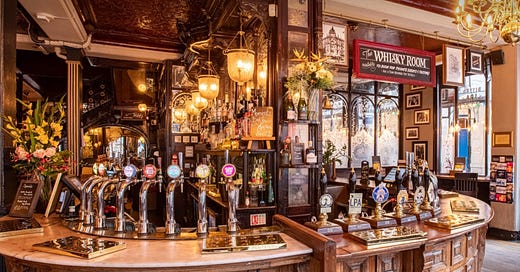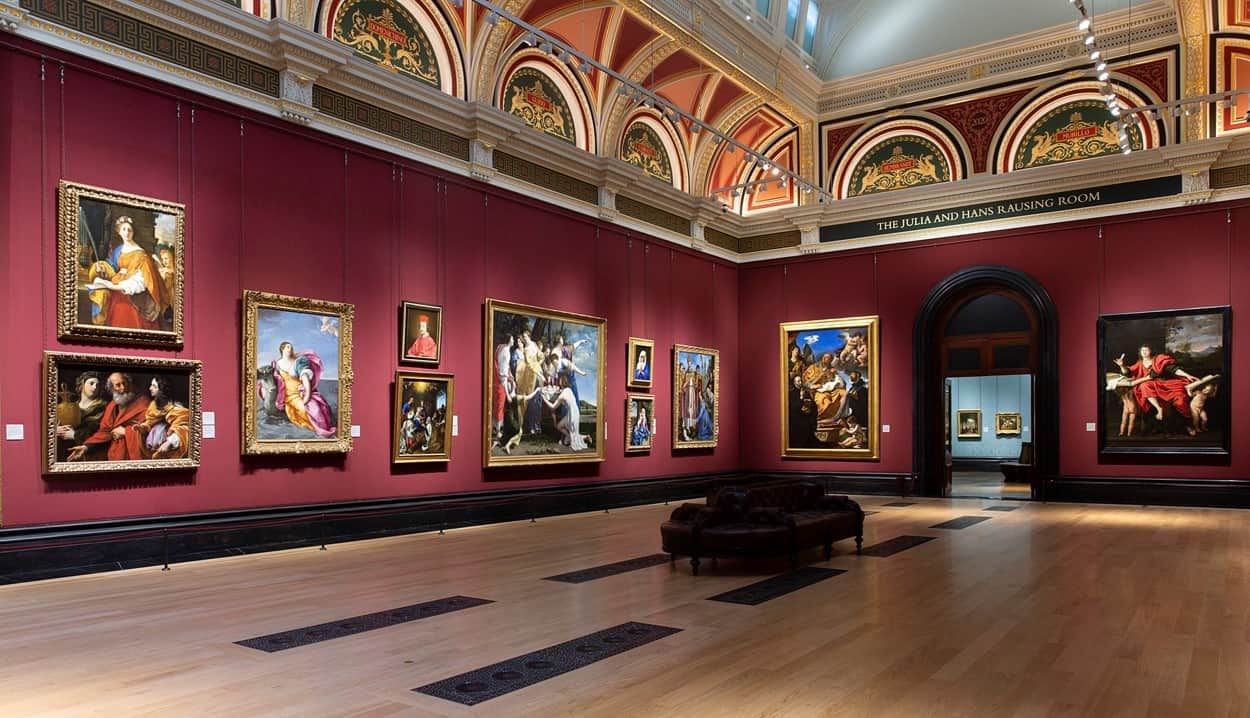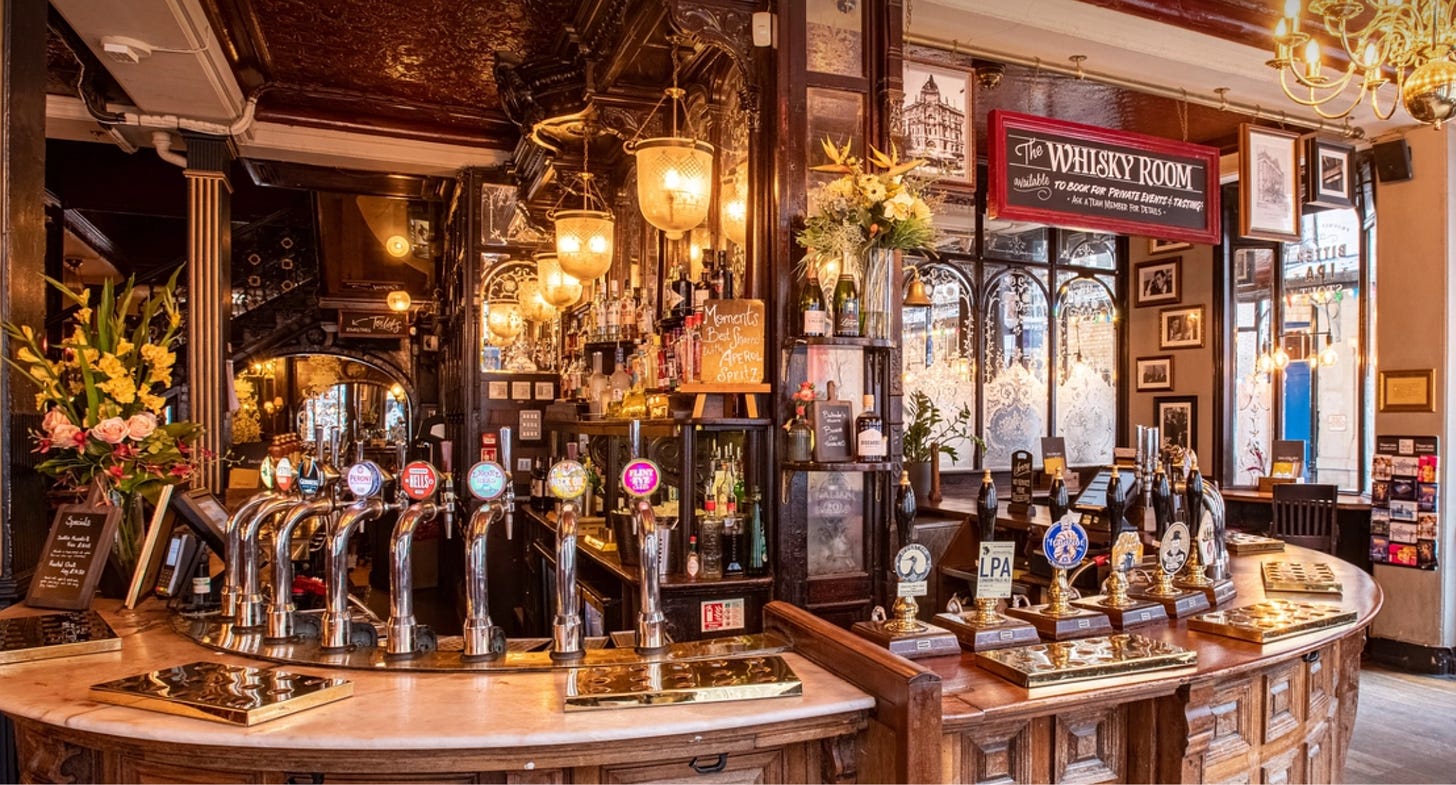Please, Stop Playing Music Everywhere
A relatively trivial complaint, but a passionate one.
I was recently at a charming Italian restaurant with friends, and practising a secular grace I noticed how grateful I was for the circumstances. A dim candle, exposed brick, an abundance of tasteful Italian photography — all of it an enviable mise-en-scène for what was a decidedly satisfying meal. It seemed that everything, from the wine to the decor to the service, was of outstanding calibre.
It was almost perfect. Almost. I thought to myself, do you know what this really needs? Do you know what would really complete this? Some Dua Lipa. Yes, all this ambient chatter is a novel relic of what dining used to be like, but we are in Britain, first and foremost, multiculturalists, and there is no better evidence of assimilation than the supplanting of our country’s crap food without the supplanting of its crap music!
As far as I am aware and can imagine, nobody has ever thought this. Why, then, are we so routinely confronted with music completely unbefitting of our circumstances? I love music. I even quite like Dua Lipa. But there is, as they say, a time and a place. Even now, as I write these words, Alec Benjamin is serenading me from the ceiling. Let Me Down Slowly, a melancholy breakup song, to be precise. A catchy tune, perhaps, but I would have named a hundred genres, let alone songs, that I would rather have dictating the mood of what is supposed to be a productive essay-writing session in an otherwise quite classy cafe.
It is sometimes said that architecture is the only form of art which imposes itself. Perhaps this was true before the invention of the loudspeaker. When confronted with the British Telecom communications tower, I am at least granted the small mercy of being able to look the other way. This other, more violent, sustained assault on our hedonic receptors, however, is one which attacks our every flank.
I write here for you a plea, if not for a ceasefire, at least for someone to explain how we got here. I can’t even board a flight without competing for airspace with Jess Glynn (or Duo des Fleurs if I have some more disposable income). Yes, we were never asked!
It has been almost a decade since Sir Roger Scruton colourfully decried the “carpet of sound” which follows us around. “And there is no law against it,” he observed. “You are rightly prevented from polluting the air of a restaurant with smoke; but nothing prevents the owner from inflicting this far worse pollution on his customers - pollution that poisons not the body but the soul.”
I quote here from an essay called “The Tyranny of Pop”. Why am I wasting your time with an unlettered imitation of a thesis already expressed? I am glad you asked. Sir Scruton’s critique lamented the ubiquity not so much of music, but of pop. “The banal melodies and mechanical rhythms, the stock harmonies recycled in song after song, these things signify the eclipse of the musical ear.” It prevents us from truly enjoying what we ought to prefer: Beethoven, Bach, Brahms.
Look, there’s something in this. I remember when I first understood what made classical so special. For most of my life, I could hardly say I found it unpleasant, but I certainly didn’t feel the worth in dedicating such lengths of time as were required to enjoy this kind of music as an activity.
Then, in my attempt to begin studying the different but related school of art history, I came across a request from John Berger written in the first chapter of Ways of Seeing. Presenting the reader with a painting of a wheat field with some crows flying above it, he asks us to reflect on it for a moment, and then turn the page.
Overleaf is the same painting, but this time with a caption: “This is the last image that Van Gogh painted before he killed himself.”
We are demanded by this exercise to confront a question: how much of our interaction with art is not about the art but about the interaction? To what extent does context dictate the very way we see a thing? And not just the context in which it was created: also the context in which it is consumed. Suppose you learned that a door handle in your home had been designed and constructed over 500 years ago. Would you see it differently? Would it become art?
This in mind, I returned to the familiar tones of Beethoven’s Symphony No. 5 in C minor, Op. 67. Even the title is boring and inaccessible. I couldn’t count the number of times I had heard those opening four notes (yet curiously I also could not remember a single time I had chosen to listen to them). Nothing about the piece excited me. And why would it?
Yet now it is December 22nd 1808 in Vienna, and I am going to the theatre. There are no iPhones or bluetooth headphones. The only time I hear music — ever — aside from learning an instrument myself or happening upon a street performer, is if I go down to the box office, purchase a ticket, come home, put on my suit and my hat, walk to the venue, shuffle into a seat, wait for the orchestra to emerge, and quieten down with the rest of the audience. I may not have heard a singular note of music for months. And then:
DUN DUN DUN DUN.
Woah.
DUN DUN DUN DUN.
Suddenly, this is one of the most impressive and emotive series of sounds I have ever heard. Suddenly, I am experiencing classical music in the foreground, not the background. And suddenly, I am enjoying it.
Sir Scruton was right to lament that our understanding of the musical art-form has been drastically altered. But he was wrong to blame it on “pop” (itself not even really a genre, but rather whatever genre most people enjoy in a given era).
“Increasingly,” he says of what is evidently his favourite musical flavour, “young ears cannot reach out to this enchanted world, and therefore turn away from it. The loss is theirs, but you cannot explain that to them, any more than you can explain the beauty of colours to someone who is congenitally blind.”
I think this sentiment somewhat spoils what is otherwise a supremely gratifying rant. Scruton doesn’t seem to appreciate pop music at all. He grimaces at the prospect of rhythm created by a computer, “[thrusting] its booming bass notes into the very bones of the victim”. It is of course perfectly okay not to enjoy it, but there is something that real instruments simply cannot replicate in the mathematical perfection of, say, EDM. The loss here is Scruton’s.
What he undoubtedly gets correct in all this, however, is the way in which we are forced to listen to it. And, more grotesquely, in situations which cry out for different music, or no music at all.
Music is, if I can underline one point, part of the decor. I can only imagine how much time and money a new restaurant spends, before opening, hiring specialists to design every inch of its wallpaper, carpets, cutlery, and menus. Which bar layout is more welcoming? Which chairs more feng shui?
How much thought do you suppose, comparatively, goes into its sound design? This element of the space’s design is not just to be taken seriously; it has perhaps the single most affective influence over the mood of a customer. And yet we end up with spaces which look like restaurants but sound like nightclubs.
Again, to reiterate: I like nightclubs. I like their music. I just don’t like hearing it in a cafe at 11am. We should greet such circumstances with as much suspicion as we would a nightclub which only quietly plays Chopin. Who is this for? Nobody came here for this!1
No, the issue is not pop, but context. I am glad that we can listen to classical music in our living rooms, and pause it to go to the toilet (or indeed take it with us). I think the newfound accessibility of music, to those who would before have not had the time or money to afford it, is something to celebrate with extreme gratitude. Bach on a bike is a luxury that our grandparents could only have dreamt of.
But we should keep in mind, when we do engage with it in this way, that it has been stripped of its intended context. Much like the altarpiece stripped from a church and rehoused in an art gallery somewhere, we run the risk of plucking a flower: attempting to possess it, we kill it. No longer the central focus of an intricately designed house of worship, The Virgin of the Rocks becomes just one image among many hanging on a wall somewhere in London, surrounded by so many similar images in such abundance that we may even fail to notice it, and fail to be captivated if we do.
The case of music is much worse. We do not take it from its rightful place to collect in a museum somewhere, housed in a neoclassical temple on Trafalgar Square; we instead shoehorn it into restaurants, cafes, and shops with impunity. Sometimes this works. Many times it does not. When I’m on hold with Barclays, I would like to be getting on with other things while I wait. I would genuinely prefer not be subjected to some ludicrous elevator music which I cannot turn down in case I miss the call.
I am sometimes told that pubs, cafes, and restaurants are simply in need of “background music”, without which awkward silences and stale air would prevail. I am not convinced of this, but even if it were true, the music should be just that: in the background. I should have to stop talking and strain my ear a bit to figure out what song is playing, if I want to. I should not have stop talking because I cannot hear myself think, and strain my ear to hear the person next to me repeat his question for the seventh time.
The National Gallery is currently under renovation. Suppose that one of its new initiatives was to install speakers, so that you can listen to Coldplay, Sabrina Carpenter, and Taylor Swift while you study the Arnolfini Portrait. You know, just to lighten the mood.
This is what we do when we deface, say, a Victorian pub with nondescript electropop. George Orwell once wrote a fictional account of his ideal pub, which he called “The Moon Under Water”. I will not recommend that we adhere to all of his recommendations (not least because the inclusion of a separate “ladies’ bar” would diminish one of the great joys of going out in the first place), but I will steadfastly agree with his assertion that…
In the Moon Under Water it is always quiet enough to talk. The house possesses neither a radio nor a piano, and even on Christmas Eve and such occasions the singing that happens is of a decorous kind.
(Have you ever wondered why Wetherspoon pubs, 15 of which are called The Moon Under Water, almost never play music? Go to one on a Saturday night and see if you can discover this “awkward silence” I am so often warned about.)
***
I just stopped writing. I was about to implore you, if you don’t agree with me, to visit some old pub in central London and see what you think. But why not do it myself? I have walked into the Salisbury on St Martin’s Lane, from which I am now writing to you. Built in 1899, it is a Historic England Grade II listed building. The Campaign for Real Ale describes the inside as “an historic pub interior of national importance”, thanks to its “impressively lavish interior with etched and polished glass creating a glittering atmosphere, a separate snug, and Art Nouveau candelabra in the main room.”
The back of the food menu celebrates its late Victorian interior, and its history as the location of Liz Taylor’s second engagement to Richard Burton. “Everyone from Oscar Wilde to Marianna Faithful,” it boasts, “have mingled & partied amongst our bronze nymphs’ lampshades.”
Now, reader, what music do you imagine is playing? These descriptions are not overstatements; it truly is one of the most beautiful public houses in England. Do you know what this really needs? Do you know what would really complete this? Today’s DJ thinks the answer is Kids by Robbie Williams and Kylie Minogue. I’m going to leave now.
Of course, a classical nightclub sounds like a great time, if designed with intention. If no other kind of nightclub were possible to find, partygoers would be at a loss. Nobody goes to a cafe to hear pop music. Nobody has ever said to me, “We must get a drink at this wonderful spot: the coffee tastes great, and they’re always playing Dance Monkey!”








I'd take it one step further, even. You know how video games often have music written specially for them that can go on to outlive the games themselves? I'm thinking of the soundtrack to games like Pokémon, Legend of Zelda, Skyrim, Persona, Nier, Final Fantasy, Minecraft, etc. I often put on music from these games in the background of my room to study or fall asleep to. Why not have music specially written for our environments? I don't see why we can have such a wonderful soundtrack accompanying Jubilife City in Pokémon Daimond and Pearl, but not for our IRL cities!
Love this! I live in south Louisiana, and when my favorite Italian restaurant changed ownership a few years ago, it switched from playing Italian opera to jazz. Great as Louis Armstrong is, he can’t nearly elevate a glass of Chianti like Puccini!